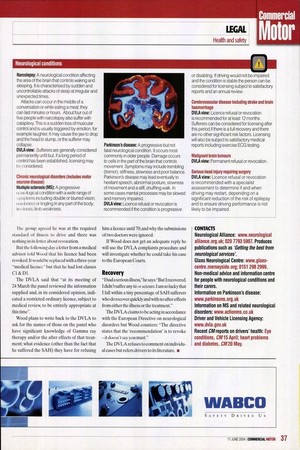Neurological conditions
Page 35

If you've noticed an error in this article please click here to report it so we can fix it.
Narcolepsy: A neurological condition affecting the area of the brain that controls waking and sleeping. It is characterised by sudden and uncontrollable attacks of sleep at irregular and unexpected times.
Attacks can occur in the middle of a conversation or while eating a meal; they can last minutes or hours. About four out of five people with narcolepsy also suffer with cataplexy. This is a sudden loss of muscular control and is usually triggered by emotion, for example laughter. It may cause the jaw to drop and the head to slump, or the sufferer may collapse.
DVLA view: Sufferers are generally considered permanently unfit but, if a long period of control has been established, licensing may be considered. Chronic neurological disorders (includes motor neurone disease) Multiple sclerosis (MS): A progressive ut irological condition with a wide range of .yit Iptonns including double or blurred vision;
'till' or tingling in any part of the body; Iii tless; limb weakness.
Parkinson's disease: A progressive but not fatal neurological condition. It occurs most commonly in older people. Damage occurs to cells in the part of the brain that controls movement. Symptoms may include trembling (tremor), stiffness, slowness and poor balance. Parkinson's disease may lead eventually to hesitant speech, abnormal posture, slowness of movement and a stiff, shuffling walk. In some cases mental processes may be slowed and memory impaired. DVLA view: Licence refusal or revocation is recommended if the condition is progressive
NNW or disabling. If driving would not be impaired and the condition is stable the person can be considered for licensing subject to satisfactory reports and an annual review. Cerebrovascular disease including stroke and brain haemorrhage
NIA view: Licence refusal or revocation is recommended for at least 12 months. Sufferers can be considered for licensing after this period if there is a full recovery and there are no other significant risk factors. Licensing will also be subject to satisfactory medical reports including exercise ECG testing. Malignant brain tumours
DVLA view: Permanent refusal or revocation. Serious head injury requiring surgery
DVLA view: Licence refusal or revocation is recommended with a specialist assessment to determine if and when driving may restart, depending on a significant reduction of the risk of epilepsy and to ensure driving performance is not likely to be impaired.




























































































































































































